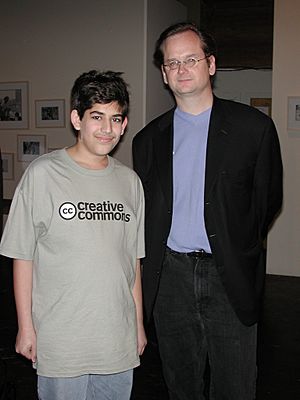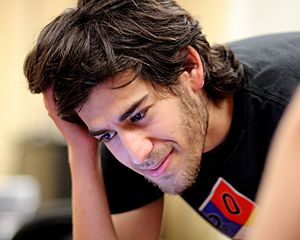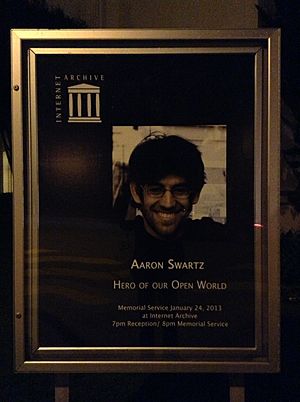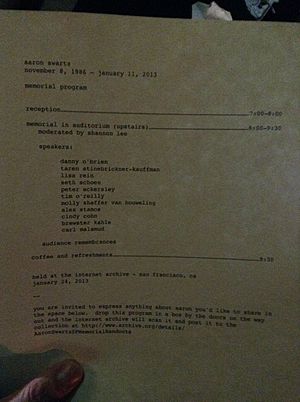Aaron Swartz facts for kids
Quick facts for kids
Aaron Swartz
|
|
|---|---|
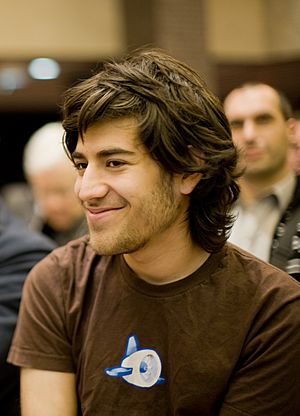
Swartz at a Creative Commons event on December 13, 2008
|
|
| Born |
Aaron Hillel Swartz
November 8, 1986 Highland Park, Illinois, U.S.
|
| Died | January 11, 2013 (aged 26) New York City, U.S.
|
| Education | Stanford University |
| Occupation |
|
| Organization |
|
| Title | Fellow, Harvard University Edmond J. Safra Center for Ethics |
| Awards |
|
Aaron Hillel Swartz (November 8, 1986 – January 11, 2013) was an American computer programmer, writer, and internet activist. He helped create important internet tools and fought for free access to information.
Aaron helped develop the web feed format RSS, which lets you get updates from websites. He also worked on Creative Commons, an organization that offers easy-to-use copyright licenses. He co-founded the popular social news website Reddit. Aaron was known for his work on civic awareness and activism, always pushing for a more open and fair internet.
After Reddit was sold in 2006, Aaron focused more on activism. He helped start the Progressive Change Campaign Committee in 2009. In 2010, he became a researcher at Harvard University. He also founded Demand Progress, a group known for fighting against the Stop Online Piracy Act (SOPA).
On January 6, 2011, Aaron was arrested by MIT police. He had connected a computer to the MIT network to download many academic articles from JSTOR. Federal prosecutors later charged him with various computer crimes. Aaron did not accept a deal that would have sent him to prison. He was found dead in his apartment on January 11, 2013. In 2013, he was added to the Internet Hall of Fame.
Contents
Growing Up
Aaron Swartz was born in Highland Park, Illinois, a town near Chicago. He was the oldest of three children. His father started a software company, and Aaron became interested in computers and the internet from a young age. He went to a private school until ninth grade, then took college courses.
In 1999, when he was just twelve, Aaron created a website called The Info Network. It was an encyclopedia where users could add information. This site won the ArsDigita Prize, which recognized young people who made "useful, educational, and collaborative" websites. This award brought early attention to his coding skills.
At 14, he joined a group that helped create RSS 1.0, a way for websites to share updates. A year later, he got involved with the Creative Commons organization. In 2005, he started at Stanford University but left after his first year to pursue his own projects.
Building New Things
During his first year at Stanford, Aaron joined a program called Y Combinator. He wanted to build a flexible system for creating websites called Infogami. He worked on it with a co-founder, but decided not to return to Stanford. Instead, he continued to develop Infogami.
For Infogami, Aaron created a web framework called web.py. He wasn't happy with other tools available for the Python language. In late 2005, he worked with the creators of Reddit to rewrite their website using Python and web.py. Even though Infogami's platform wasn't used much later, its software helped the Internet Archive's Open Library project. The web.py framework became popular for many other projects.
When Infogami couldn't get more funding, Y Combinator suggested it merge with Reddit. This happened in November 2005, and Aaron became a co-founder of Reddit. Both projects struggled at first, but Reddit became very popular in 2005 and 2006.
In October 2006, Reddit's success led to its sale to Condé Nast Publications. Aaron moved to San Francisco to keep working on Reddit. However, he found corporate office life difficult and eventually left the company. In September 2007, he started a new company called Jottit with his Infogami co-founder.
Fighting for Change
In 2008, Aaron started Watchdog.net, a website to gather and show information about politicians. That year, he wrote a famous essay called Guerilla Open Access Manifesto. In 2010, he asked for government information about Chelsea Manning, who was accused of sharing secrets with WikiLeaks.
Making Court Records Free
In 2008, Aaron downloaded about 2.7 million federal court documents from the PACER database. This database is managed by the U.S. courts.
The Huffington Post explained his actions: "Swartz downloaded public court documents from the PACER system to make them available for free." PACER was charging eight cents per page for information that many believed should be free. These documents are public and not covered by copyright. The fees were used to fund court technology, but the system had a large surplus.
A person named Carl Malamud argued that the documents should be free. He asked activists to download court documents from libraries that had free access to PACER and send them to him.
Aaron read Malamud's request and used a computer script to download the documents. He used login details from a Sacramento library. From September 4 to 20, 2008, he accessed and uploaded millions of documents. He then shared them with Malamud's organization.
On September 29, 2008, the government stopped the free trial of PACER. The FBI investigated Aaron's actions, but no charges were filed. Aaron later learned details of the investigation through a public information request. PACER still charges per page, but there are now tools like RECAP that help users save documents for free public access.
Helping Progressive Causes
In 2009, Aaron wanted to learn how to be a more effective activist. He helped launch the Progressive Change Campaign Committee. He wrote that he spent his days "experimenting with new ways to get progressive policies enacted and progressive politicians elected." He led his first activism event with this group. They delivered thousands of signatures to Massachusetts lawmakers, asking them to support healthcare reform.
Starting Demand Progress
In 2010, Aaron co-founded Demand Progress. This group helps people online take action by contacting leaders and spreading awareness about civil liberties and government reform.
During 2010 and 2011, Aaron researched political corruption at Harvard University.
Author Cory Doctorow used Aaron's advice in his novel Homeland. The book shows how a character could use public information to create a grassroots political campaign. Aaron wrote in the book's afterword: "These political hacktivist tools can be used by anyone motivated and talented enough.... Now it's up to you to change the system."
Fighting SOPA
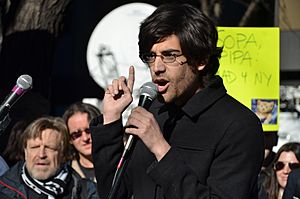
Aaron was very involved in the fight against the Stop Online Piracy Act (SOPA). This bill aimed to stop online copyright violations. However, many people criticized it because it could make it too easy for the government to shut down websites. It would also put too much burden on internet providers. After the bill was defeated, Aaron gave a speech in Washington, D.C.
He said, "We won this fight because everyone made themselves the hero of their own story." He was talking about the huge protests against the bill by many websites. The Electronic Frontier Foundation called it the biggest protest in internet history.
Wikipedia Work
Aaron contributed to Wikipedia starting in August 2003. In 2006, he ran for a position on the Wikimedia Foundation's Board of Trustees, but he was not elected.
In 2006, Aaron studied how Wikipedia articles are written. He found that most of the content came from many occasional contributors. These "outsiders" made only a few edits. A smaller group of 500 to 1,000 regular editors mostly corrected spelling and formatting. He concluded that the formatters helped the contributors, not the other way around. His findings were different from what Wikipedia co-founder Jimmy Wales believed.
The JSTOR Case
Authorities stated that Aaron downloaded many academic articles from JSTOR using MIT's computer network. This happened over several weeks in late 2010 and early 2011. Visitors to MIT's campus could access JSTOR through its network. Aaron, as a Harvard researcher, also had a JSTOR account.
The Downloads
On September 25, 2010, an MIT computer began sending hundreds of requests per minute to the JSTOR website. This slowed down the site. JSTOR blocked that computer. Another MIT computer then started sending requests, leading to a temporary block on all MIT computers.
Authorities said Aaron downloaded the documents using a laptop connected to a network switch at MIT. The door to this room was unlocked. When the activity was discovered, a camera was placed in the room. Aaron's computer was left untouched. The recording stopped once Aaron was identified. JSTOR later reached an agreement with Aaron in June 2011, where he gave back the downloaded data.
On July 30, 2013, JSTOR released 300 documents that were used as evidence against Aaron. These documents had been sent to the U.S. Attorney's Office for the case.
Legal Challenges
On January 6, 2011, Aaron was arrested near the Harvard campus by MIT Police and a Secret Service agent. He was charged with breaking and entering.
On July 11, 2011, a federal grand jury charged him with wire fraud and computer fraud.
On September 12, 2012, federal prosecutors added more charges. This increased the possible penalties. During talks with Aaron's lawyers, prosecutors offered a deal: six months in prison if Aaron pleaded guilty to 13 federal crimes. Aaron and his lawyer rejected this deal. They wanted a trial where prosecutors would have to explain their actions.
Many critics, including former White House counsel John Dean, called the charges "overcharging" and the prosecution "overzealous."
Aaron Swartz died on January 11, 2013. After his death, federal prosecutors dropped the charges. On December 4, 2013, documents related to the case were released. These included a video of Aaron entering the MIT network closet.
Remembering Aaron
Aaron Swartz's family and partner created a memorial website. They said: "He used his amazing skills as a programmer and technologist not to get rich, but to make the Internet and the world a fairer, better place."
Lawrence Lessig, a friend and lawyer, wrote an essay called "Prosecutor as Bully." He criticized the unfairness of Aaron's prosecution. He said, "The question this government needs to answer is why it was so necessary that Aaron Swartz be labeled a 'felon'." Cory Doctorow wrote that Aaron "had an unbeatable combination of political insight, technical skill, and intelligence." He believed Aaron "could have revolutionized American (and worldwide) politics."
Funeral and Memorials
Aaron's funeral was held on January 15, 2013, in Illinois. Tim Berners-Lee, who created the World Wide Web, spoke at the funeral. His partner, Taren Stinebrickner-Kauffman, told The Wall Street Journal that Aaron didn't have money for a trial. He also didn't want to make his personal struggles public by asking for help.
Many memorial events followed. On January 19, hundreds attended a memorial in New York. Speakers included his partner, open source advocates, and journalists. On January 24, another memorial was held in San Francisco. On February 4, a memorial took place in Washington, D.C., with lawmakers speaking. A memorial was also held at the MIT Media Lab on March 12.
Aaron's family suggested donations to GiveWell in his memory. This is an organization Aaron admired and supported.
Aaron's Impact
Open Access Movement
After Aaron's death, supporters started an effort called #PDFTribute to promote Open Access. This means making research and information freely available to everyone. Scholars began posting their academic articles online using the hashtag. Aaron's story brought more attention to the idea of open access to scientific publications. Many groups and people have since campaigned for free access to scientific knowledge.
In 2013, Aaron was given the American Library Association's James Madison Award. This award recognized him as a strong supporter of public involvement in government and free access to scholarly articles. In March, the editors of a journal called Journal of Library Administration resigned. They disagreed with the publisher because the journal was not open access. They felt it was wrong after Aaron's death. Aaron had said that when he died, he wanted all his hard drive contents to be public.
Government Response
Several members of the U.S. House of Representatives questioned how the government handled Aaron's case.
Congressman Jared Polis called the charges "ridiculous." He said Aaron was a "martyr" and that his death showed the need to limit the power of federal prosecutors.
Senator Elizabeth Warren said Aaron's "advocacy for Internet freedom, social justice, and Wall Street reform demonstrated ... the power of his ideas."
Senator John Cornyn asked the Attorney General why the prosecution was considered "appropriate." He also asked if it was revenge for Aaron using his rights under the Freedom of Information Act.
Congressional Investigations
Congressman Darrell Issa announced that his committee would investigate the Justice Department's actions. He praised Aaron's work for "open government and free access to the people." This investigation received support from both political parties.
On January 28, 2013, Issa and Congressman Elijah Cummings wrote to the Attorney General. They asked why more serious charges were filed against Aaron. On February 20, it was reported that the prosecutor, Carmen Ortiz, might testify about the case. Congressional staff were told that Aaron's Guerilla Open Access Manifesto played a role in the decision to prosecute him. Staff believed prosecutors felt Aaron had to be convicted to justify the case.
Aaron's partner, Taren Stinebrickner-Kauffman, said the Justice Department was acting out of "vengeance." She said they were wrong to rely on Aaron's Guerilla Open Access Manifesto as his current beliefs. She said he was interested in many issues, not just open access.
On March 6, Attorney General Eric Holder said the case was "a good use of prosecutorial discretion." Aaron's partner disagreed. She claimed the prosecutor had acted improperly. On March 22, Senator Al Franken wrote to Holder, saying that charging Aaron with offenses that could lead to 35 years in prison seemed "remarkably aggressive." This was especially true since JSTOR, the main party involved, did not support a criminal prosecution.
FASTR Act
The Fair Access to Science and Technology Research Act (FASTR) is a bill that would require taxpayer-funded research to be released publicly sooner. It's sometimes called "The Other Aaron's Law."
Senators Ron Wyden and John Cornyn introduced the bill. Representatives Zoe Lofgren, Mike Doyle, and Kevin Yoder introduced it in the House. Senator Wyden wrote that "access to taxpayer funded research should never be hidden behind a paywall."
While the bill had not passed as of 2017, it encouraged the U.S. government to move toward more open access. Soon after the bill was introduced, the Office of Science and Technology Policy told federal agencies to make plans for increasing public access to research results.
Films About Aaron
Aaron Swartz has been featured in several films. In 2013, artist Kenneth Goldsmith dedicated his "Printing out the Internet" exhibition to Aaron.
The Internet's Own Boy
On January 11, 2014, a year after his death, a preview was released for The Internet's Own Boy: The Story of Aaron Swartz. This documentary is about Aaron, the NSA, and SOPA. The film was officially shown at the Sundance Film Festival in January 2014. Democracy Now! covered the film's release and Aaron's life. The documentary is available under a Creative Commons License. It was released in theaters and online in June 2014.
Mashable called the documentary "a powerful homage to Aaron Swartz." It received a standing ovation at Sundance. Mashable said the film "makes a clear argument: Swartz unjustly became a victim of the rights and freedoms for which he stood." The Hollywood Reporter called it a "heartbreaking" story of a "tech wunderkind persecuted by the U.S. government." They said it was a must-see for anyone who cares about how laws affect information online.
Killswitch
In October 2014, Killswitch, another documentary featuring Aaron Swartz, premiered. It also included Lawrence Lessig, Tim Wu, and Edward Snowden. The film won an award for Best Editing. It focuses on Aaron's role in fighting for internet freedoms.
In February 2015, Killswitch was shown at the Capitol Visitor's Center in Washington, D.C. Congressman Alan Grayson invited the film. The event happened just before the Federal Communications Commission made a big decision about Net Neutrality. Congressman Grayson and Lawrence Lessig spoke about Aaron and his fight for a free and open internet.
Congressman Grayson said Killswitch is "one of the most honest accounts of the battle to control the Internet." Critics praised the film for its powerful storytelling and its focus on the human side of the internet freedom fight.
Other Films
Patriot of the Web is an independent film about Aaron Swartz. It was released on YouTube on September 15, 2019. Actor Shawn Mcclintock plays Aaron Swartz.
Another film about Aaron, Think Aaron, is being developed by HBO Films.
Aaron's Creations
Technical Specifications
- Markdown: Aaron was a major contributor to John Gruber's Markdown. This is a simple way to write text that can be easily turned into HTML for websites. Aaron also created a tool to convert HTML back to Markdown. Markdown is still widely used today on websites like Reddit and GitHub.
- RDF/XML at W3C: In 2001, Aaron joined a working group at the World Wide Web Consortium (W3C). He helped create a new type of internet media called "RDF/XML." This was designed to support the Semantic Web, which aims to make internet data more understandable by computers.
Software Projects
- DeadDrop: In 2011–2012, Aaron, Kevin Poulsen, and James Dolan created DeadDrop. This system allows people to send electronic documents anonymously without fear of being identified. In May 2013, The New Yorker launched the first version of this software, calling it Strongbox. The Freedom of the Press Foundation now manages the software, which is called SecureDrop.
- Tor2web: In 2008, Aaron worked with Virgil Griffith to create Tor2web. This tool helps people easily access websites on the Tor-hidden service network using a regular web browser. The software is now maintained as part of the GlobaLeaks project.
Writings
- Swartz, Aaron; Hendler, James (October 2001). "The Semantic Web: A network of content for the digital city". Proceedings of the Second Annual Digital Cities Workshop (Kyoto, JP: Blogspace). http://blogspace.com/rdf/SwartzHendler.
- Swartz, Aaron (January–February 2002). "MusicBrainz: A Semantic Web service". IEEE Intelligent Systems 17 (1): 76–77. doi:10.1109/5254.988466. ISSN 1541-1672. http://www.csee.umbc.edu/courses/771/papers/ieeeIntelligentSystems/webservices/musicBrainz.pdf.
- Swartz, Aaron; Hendler, James (2009). Building programmable Web sites. S.F.: Morgan & Claypool. ISBN 978-1-59829-920-5.
- Swartz, Aaron (Interviewee). We can change the world (Video). Archived from the original on 2021-12-21 – via YouTube.
- Swartz, Aaron (Speaker) (May 21, 2012). Keynote address at Freedom To Connect 2012: How we stopped SOPA (Video). D.C. Archived from the original on 2021-12-21 – via YouTube.
- Swartz, Aaron (February 2013). "Aaron Swartz's A Programmable Web: An Unfinished Work". Synthesis Lectures on the Semantic Web: Theory and Technology (Morgan & Claypool Publishers) 3 (2): 1–64. doi:10.2200/S00481ED1V01Y201302WBE005. http://www.morganclaypool.com/doi/abs/10.2200/S00481ED1V01Y201302WBE005. "To Dan Connolly, who not only created the Web but found time to teach it to me.".
- Swartz, Aaron (January 2016). The Boy Who Could Change the World: The Writings of Aaron Swartz. The New Press. OLOL25886237M. https://thenewpress.com/books/boy-who-could-change-world.
See Also
 In Spanish: Aaron Swartz para niños
In Spanish: Aaron Swartz para niños
- Alexandra Elbakyan
- List of Wikipedia people
- Sci-Hub
- Shadow library
 | Madam C. J. Walker |
 | Janet Emerson Bashen |
 | Annie Turnbo Malone |
 | Maggie L. Walker |


